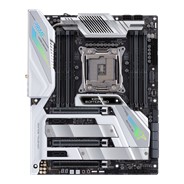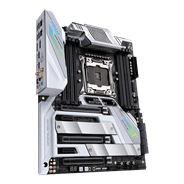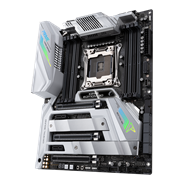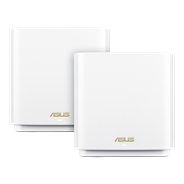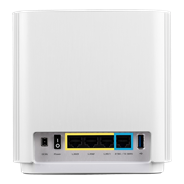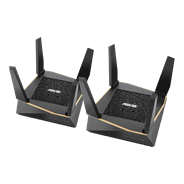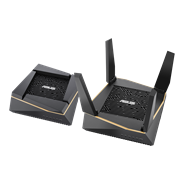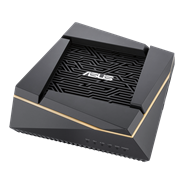- Next-Gen WiFi Standard - 802.11ax WiFi standard for better efficiency and throughput.
- Ultrafast WiFi Speed - 6000Mbps WiFi speed to handle even the busiest network with ease.
- Wider Usage and More Convenience - 4 antennas + 8 LAN ports to support more clients at the same time.
- Commercial-grade Security - AiProtection, powered by Trend Micro™, blocks internet security threats for all your connected smart devices.
- Better Partner with Mesh System - Compatible with ASUS AiMesh WiFi system for seamless whole-home coverage.
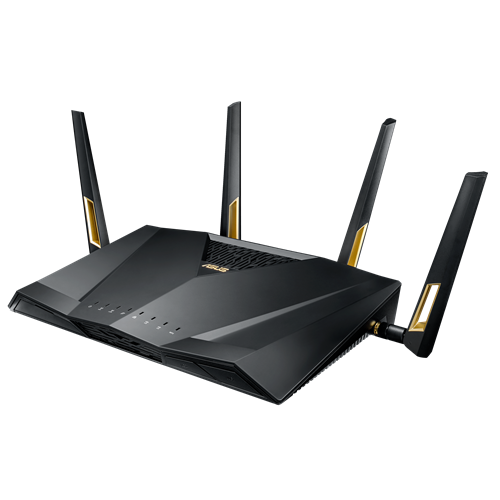

The New Era of Home WiFi
The growing number of connected personal and IoT devices has led to an overall increase in network density that is pushing the limits of the current Wi-Fi standard. The latest 802.11ax standard provides future-proof technologies, higher network efficiency, faster Wi-Fi speeds, greater coverage and improved battery life for connected devices, providing a significantly better networking experience for users.
Warp-speed WiFi
|
802.11ax 4X4 6000Mbps |
 |
|
802.11ac 4X4 2600Mbps |

Network Efficiency
Power Saving
Better Coverage
-
Network Efficiency
Built for Multi-device Households
With a revolutionary combination of OFDMA and MU-MIMO technology, 802.11ax technology provides up to 4X greater network capacity and efficiency in traffic-dense environments. Previous-generation 802.11ac Wi-Fi can only handle one device at a time on each network channel, which is an inefficient use of available bandwidth. OFDMA support in the 802.11ax Wi-Fi standard divides each channel into small sub-channels, allowing signals from multiple devices* to be bundled together and transmitted simultaneously, reducing latency for a smoother, more responsive Wi-Fi experience.
![In the past: 1 device processed at a time]()
802.11ac OFDM
Bandwidth wasted - Higher latency
![Now: Multi-devices processed simultaneously]()
802.11ax OFDMA
Bandwidth fully utilized - Lower latency
-
Power Saving
Better Battery Life for Your Devices
Target Wake Time (TWT) allows RT-AX88U to schedule designated intervals for devices to transmit data. This allows them to sleep when there is no need to wait for a router signal, reducing power consumption by up to 7X for significantly improved battery life*.
Without Target Wake Time
802.11ac![In the past: 1 device processed at a time]()
Higher Device Power Consumption
With Target Wake Time
802.11ax![Now: Multi-devices processed simultaneously]()
7X better battery life for client devices
-
Better Coverage
WiFi that Goes Farther
With the latest 802.11ax WiFi standard featuring OFDMA technology, RT-AX88U provides increased WiFi signal range and better coverage by dividing each channel into smaller sub-channels. These sub-channels have a smaller bandwidth that enables them to travel up to 80% farther1, resulting in a better WiFi connection throughout your home*.
![]()
802.11ax Technology
Up to 80%
Better Range*![]()
9dB
![]()
802.11ac Technology
Give your Online Gaming a Double Boost
Game Ping |
10 -15% Lower 30 -60% Lower 45 -75% Lower 0% Lower |
 |
|
 |

|
-


1st Priority
-


-


-


-


1st Priority
-


Commercial-grade Security for your Home Network

Wired or Wireless. The Choice is Yours.
More LAN Ports for
More Convenience
Eight Gigabit LAN ports make



Wireless that's as Stable as Wired Ethernet
When you are far away from your router, enjoying the stability of a wired network connection is usually impractical or impossible. With special designed antennas, AiRadar beamforming and RangeBoost technology,

Powerful Whole-home Wi-Fi System.
The Way You Want.
In most cases, your

Turn your ASUS routers into whole-home Wi-Fi system with a simple firmware update
Mix and match preferred models from selected ASUS routers
Create a Wi-Fi network with either a single SSID or multiple SSIDs
All router features works across the entire Wi-Fi system
Extreme Power with 1.8GHz Quad-core CPU

Disclaimers:
- 1 The data refers to uplink OFDMA
- 2 The free router edition supports one selectable device on your network at a time with GPN traffic limits, and includes wtfast® technical support. Users can pay to upgrade to the advanced version for simultaneous acceleration of multiple devices with more GPN traffic and advanced features. Check out supported games list here.
- * To benefit from 802.11ax features, the Wi-Fi client needs to be 802.11ax capable.
- ** Actual data throughput and WiFi coverage will vary from network conditions and environmental factors, including the volume of network traffic, building material and construction, and network overhead, result in lower actual data throughput and wireless coverage.
- *** Quoted network speeds and bandwidth based on current IEEE 802.11ax specifications. Actual performance may be affected by network and service provider factors, interface type, and other conditions. Connected devices must be 802.11ax-compatible for best results.






























